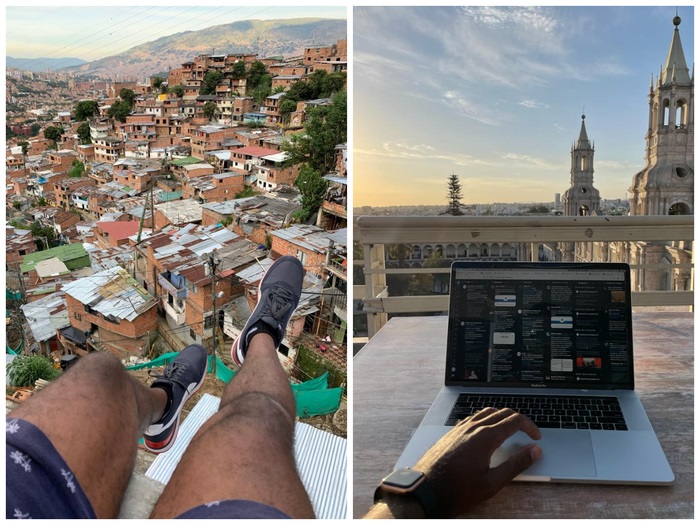The Secret to Landing Remote Jobs Abroad While Still Living in Your Home Country.
Let’s be honest—who doesn’t dream of earning in foreign currency while staying right where they are? The idea of working remotely for a company overseas, from the comfort of your own home, is more than just a trend now—it’s a full-blown revolution in how people work and live.
No more spending thousands to relocate. No more waiting endlessly for visa approvals. No more struggling to adapt to an entirely new culture overnight. Today, people across the world are building international careers without ever leaving their home countries. And the best part? You can, too.
But here’s the truth—landing a remote job abroad isn’t as simple as just applying online. There’s an art to it. It’s competitive, it’s demanding, and it requires a strategy that goes beyond sending your résumé and hoping for the best.
Click to get started today
The Secret to Landing Remote Jobs Abroad While Still Living in Your Home Country
So, let’s talk about what it really takes to get that dream remote job abroad—and how you can do it without uprooting your life.
1. Understand What Companies Are Actually Looking For
Here’s the thing: international employers aren’t just looking for skilled workers. They’re looking for self-starters—people who can get the job done without constant supervision, communicate clearly across time zones, and adapt to different work cultures.
If you’re trying to land a remote job abroad, you need to show more than your technical skills. Employers want proof that you can handle autonomy. That means showcasing soft skills like communication, time management, and cross-cultural awareness.
When you’re writing your application, talk about times when you worked independently, managed deadlines across different time zones, or collaborated with people from other backgrounds. These real-world examples speak louder than a list of skills.
2. Build a Global-Ready Online Presence
Before an employer decides to interview you, they’ll probably Google you. And if your digital footprint doesn’t look professional, you’ve already lost half the battle.
Start with your LinkedIn profile—it’s your global résumé. Make sure it’s complete, polished, and tells a story that fits your remote job goals. Add a professional photo, a concise summary, and measurable achievements in your experience section.
Next, build an online portfolio that shows what you can do. Whether you’re a designer, writer, marketer, developer, or customer service professional, you should have something tangible to prove your abilities. A personal website or even a well-organized Google Drive folder with samples of your work can make a big difference.
Remember—international recruiters often compare dozens of applicants. If your profile looks global, clean, and confident, you’ll stand out.
3. Target the Right Platforms (Not Just Any Job Board)
Here’s where many people go wrong: they spend hours applying to random job listings that don’t even fit their experience or pay expectations. If you want to find serious remote opportunities abroad, you have to know where to look.
Skip the generic job boards for now and go where the international remote jobs are:
- Remote OK
- We Work Remotely
- FlexJobs
- Remotive
- LinkedIn (use “Remote” + “Worldwide” filters)
These platforms specialize in jobs that are open to global candidates. You can even filter by companies that pay in USD or Euro, or those that explicitly state “remote applicants from anywhere.”
Be consistent with your applications. Applying for remote jobs abroad isn’t a one-time effort—it’s a process. The more you tailor your applications and learn what employers respond to, the better your chances.
4. Polish Your Application Like a Pro
Think about this: employers abroad receive hundreds of applications, many from people who have the exact same qualifications as you. What makes yours different?
The answer lies in personalization. Every time you apply, write a unique cover letter that feels human and specific. Avoid copying templates. Instead, explain why you want to work with that company and how your skills will help them reach their goals.
For example, if you’re applying to a startup, highlight your adaptability and ability to work in fast-paced environments. If it’s a corporate organization, emphasize reliability, structure, and consistency.
And always proofread. Grammar mistakes, typos, or awkward phrasing can cost you a great opportunity. Treat your application like your first impression—it matters.
5. Learn to Sell Your Skills Globally
Remote jobs abroad are not always about your degree or job title. Employers care more about what you can deliver.
If you’re in a field that allows you to work remotely—like design, writing, tech, sales, digital marketing, teaching, or support—make sure your skills are internationally relevant. This might mean learning global tools like Slack, Trello, or Notion. Or it could mean improving your English communication skills to sound more confident in meetings.
Invest time in learning global standards. There are free and affordable courses online (on platforms like Coursera, Google Digital Garage, or LinkedIn Learning) that teach you exactly what international employers expect.
The more you align your skillset with global trends, the more you become a “no-brainer” hire for companies abroad.
6. Prepare for Time Zones and Cultural Differences
This is the part no one talks about enough. Working remotely for a company overseas sounds flexible, but it also means adapting to time zone differences and communication styles.
If your employer is based several hours ahead or behind your country, you’ll need to learn how to manage your schedule wisely. You might have to attend late-night or early-morning meetings sometimes—it’s part of the deal.
Culturally, it’s important to stay open-minded. Work culture in Europe, North America, or Asia can be very different. Some teams are extremely direct, while others prefer a softer tone. Some prioritize hierarchy; others thrive on collaboration.
Take time to learn these nuances. The more you understand how your colleagues work and communicate, the smoother your experience will be.
7. Network Like It’s Your Second Job
When it comes to landing remote jobs abroad, connections matter just as much as skills. Many international opportunities are never posted publicly—they’re shared within professional networks or referral systems.
Start by joining online communities in your industry. Platforms like LinkedIn, Reddit, or Slack groups for remote professionals are great places to meet people. Don’t just ask for jobs—engage genuinely. Share ideas, offer help, and learn from others’ experiences.
You’d be surprised how often one meaningful conversation turns into a job lead.
Networking isn’t about being pushy—it’s about being visible, helpful, and memorable. When people in your industry think of someone dependable and capable, your name should come to mind.
8. Be Ready for International Payments and Legalities
Once you land the job, you’ll need a reliable way to receive payments from abroad. Companies often pay via PayPal, Wise, Payoneer, or direct bank transfers. Research which option offers the lowest fees and best exchange rates for your country.
Also, make sure you understand any tax obligations related to earning foreign income. Every country has different rules, so it’s wise to consult a tax expert or at least read your local guidelines.
Being financially organized from the start keeps you stress-free and helps you build a sustainable remote career.
9. Stay Consistent and Patient
Here’s the truth: landing your first remote job abroad won’t happen overnight. It takes effort, rejection, and persistence. But each application you send, each skill you refine, and each connection you make gets you closer to the goal.
Don’t get discouraged if you don’t hear back immediately. International hiring processes can take time, and competition is fierce. The key is consistency—keep learning, keep improving, and keep showing up.
Final Thoughts
Working remotely for an overseas company while still living in your home country is one of the smartest career moves you can make today. It gives you global exposure, international pay, and the freedom to live on your own terms—all without the stress of relocating.
But it’s not just about luck. It’s about preparation, strategy, and patience. Build your online presence, apply strategically, network intentionally, and sharpen the skills that make you stand out.
The truth is, the world of work is changing—and you don’t need to move abroad to build a global career. You just need to think global, act professional, and show that distance doesn’t limit your impact.
The secret is out—it’s your turn to make it happen.










